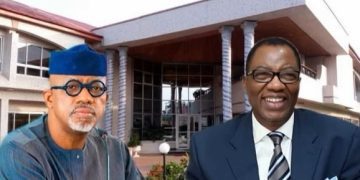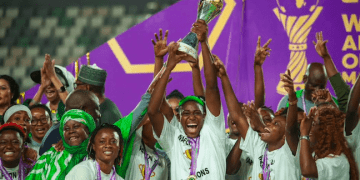Mr. President, the time for action is now. I urge you to implement policies to reduce fuel prices and make transportation more affordable, invest in job creation initiatives and support small businesses, increase funding for social welfare programs to support vulnerable populations and channel it through credible means instead of using the political class, improve electricity supply, boost the Nation’s productions capacity, engage in open dialogue with stakeholders to address the root causes of the hunger crisis among other needs
By Dayo DaSilva
In a democratic society, protest is a fundamental right of citizens. While peaceful assembly and free speech are essential democratic principles, protest is a constitutional right enshrined in Section 40, of the Nigerian Constitution.
It’s a peaceful way for people to express their grievances, hold leaders accountable, and advocate for change, thus the Nigerian youths have the right to embark on a ‘EndBadGovernance’ protest in August, to demand improved governance and leadership.
However, as Nigerian youths prepare to take to the streets in August, it’s crucial for them to know that protest is not a license to criminality or violence. Government and concerned authorities must respect and protect protesters’ rights, not suppress them.
One cannot shy away from the present realities, as President Bola Ahmed Tinubu navigates the complexities of leading Africa’s most populous nation. He must prioritize addressing the escalating hunger crisis threatening to engulf the country.
The stark reality is that Nigeria is on the brink of a catastrophic hunger protest, and it is imperative that the President takes immediate action to mitigate this looming disaster.
The situation is dire. Hunger, starvation, and abject poverty have become the harsh realities for many Nigerians. The lack of jobs, skyrocketing fuel prices (from N192 per liter to N550-N800), and general economic hardship have created a perfect storm of discontent. The nation is teetering on the edge, and it’s crucial that President Tinubu takes bold steps to address these pressing issues, without paying lips services.
While there has been various means to appeal to protesters, the government or law enforcement agencies should not in any way try to suppress them. Suppressing protesters can lead to escalation of violence. Aggressive tactics can provoke protesters, leading to more intense clashes and potentially deadly consequences. Suppressing protests can galvanize more people to join the movement, spreading unrest and instability while the global community may criticize the government’s actions, damaging its reputation and potentially leading to sanctions
As the leader of Nigeria, President Tinubu has a responsibility to protect the country’s image and ensure the well-being of its citizens. The international community is watching, and it is essential that Nigeria avoids the embarrassment of widespread hunger protests.
Mr. President, the time for action is now. I urge you to implement policies to reduce fuel prices and make transportation more affordable, invest in job creation initiatives and support small businesses, increase funding for social welfare programs to support vulnerable populations and channel it through credible means instead of using the political class, improve electricity supply, boost the Nation’s productions capacity, engage in open dialogue with stakeholders to address the root causes of the hunger crisis among other needs.
In times of troubles, great leaders rise to the challenge. President Tinubu, Nigeria needs your decisive leadership to avert this looming crisis. The nation’s future depends on it.
While there has been various means to appeal to protesters, the government or law enforcement agencies should not in any way try to suppress them. Suppressing protesters can lead to escalation of violence. Aggressive tactics can provoke protesters, leading to more intense clashes and potentially deadly consequences. Suppressing protests can galvanize more people to join the movement, spreading unrest and instability while the global community may criticize the government’s actions, damaging its reputation and potentially leading to sanctions. Suppressing protests can result in human rights abuses, including arbitrary arrests, torture, and extrajudicial killings and this can erode trust in the government, leading to increased mistrust and resentment among citizens. Heavy-handed tactics can drive protesters underground, potentially leading to radicalization and more extreme actions, this can have unforeseen effects, such as harming innocent bystanders or damaging infrastructure. As we all know, prolonged unrest and instability can harm the economy, deterring investment and tourism.
Instead, the government should engage with protesters, address their grievances, and work towards finding peaceful solutions. The government should allow the protest to take place, ensuring freedom of assembly and expression.
To ensure a peaceful protest, the Nigerian government and law enforcement agencies should establish communication channels to understand their grievances and demands, deploy police and other security agencies to maintain order, protect protesters, and prevent violence. Employ de-escalation techniques, such as dialogue and mediation, to resolve conflicts and refrain from using tear gas, rubber bullets, or live ammunition, which can escalate the situation. Any responsible government should ensure protesters’ rights are respected, including freedom of speech, assembly, and movement, while taking concrete steps to address the protesters’ demands and concerns. Government must keep the public informed about the protest and any developments and work with NGOs, community leaders, and other stakeholders to promote peace and understanding.
By taking these steps, the Nigerian government and law enforcement agencies can help ensure a peaceful and successful protest, allowing citizens to exercise their democratic rights without fear of violence or repression.
No doubt, by exercising their right to protest in the 10 days of rage, Nigerian youths are demonstrating their commitment to a better future. Let’s hope their voices are heard and their demands for good governance are met.
Dayo DaSilva (arpa, amncs) is a Mass Communication Expert and Publisher from Ogun State. Email: dsv123ng@yahoo.com
•Opinions, positions or thoughts expressed here are personal and strictly of the writers/authors and not The Daily Crucible.









































